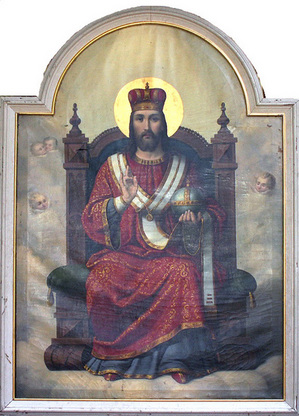 The Feast of Christ the King is of recent origin, but what it celebrates is as old as the Christian Faith itself. For the word Christ is, in fact, just the Greek translation of the word Messiah: the Anointed One, the King. Jesus of Nazareth, the crucified son of a carpenter, is so intrinsically King that the title “king” has actually become his name. by calling ourselves Christians, we label ourselves as followers of the King, as people who recognize him as their King. But we can understand properly what the kingship of Jesus Christ means only if we trace its origin in the Old Testament, where we immediately discover a surprising fact. It is obvious that God did not intend Israel to have a kingdom. The kingdom was, in fact, a result of Israel’s rebellion against God and against his prophets, a defection from the original will of God. The law was to be Israel’s king, and, through the law, God himself…. But Israel was jealous of the neighboring peoples with their powerful kings…. Surprisingly, God yield to Israel’s obstinacy and so devised a new kind of kingship for them. The son of David, the King, is Jesus; in him God entered humanity and espoused it to himself. If we look closely, we shall discover that this is, in fact, the usual form of the divine activity in relation to mankind. God does not have a fixed plan that he must carry out; on the contrary, he has many different ways of finding man and even of turning his wrong ways into right ways.
The Feast of Christ the King is of recent origin, but what it celebrates is as old as the Christian Faith itself. For the word Christ is, in fact, just the Greek translation of the word Messiah: the Anointed One, the King. Jesus of Nazareth, the crucified son of a carpenter, is so intrinsically King that the title “king” has actually become his name. by calling ourselves Christians, we label ourselves as followers of the King, as people who recognize him as their King. But we can understand properly what the kingship of Jesus Christ means only if we trace its origin in the Old Testament, where we immediately discover a surprising fact. It is obvious that God did not intend Israel to have a kingdom. The kingdom was, in fact, a result of Israel’s rebellion against God and against his prophets, a defection from the original will of God. The law was to be Israel’s king, and, through the law, God himself…. But Israel was jealous of the neighboring peoples with their powerful kings…. Surprisingly, God yield to Israel’s obstinacy and so devised a new kind of kingship for them. The son of David, the King, is Jesus; in him God entered humanity and espoused it to himself. If we look closely, we shall discover that this is, in fact, the usual form of the divine activity in relation to mankind. God does not have a fixed plan that he must carry out; on the contrary, he has many different ways of finding man and even of turning his wrong ways into right ways.
We can see that, for instance, in the case of Adam, whose fault became a happy fault, and we see it again in all the twisted ways of history. This, then, is God’s kingship–a love that is impregnable and an inventiveness that finds man by ways that are always new. For us, consequently, God’s kingship means that we must have an unshakeable confidence. For this is still true and is applicable to every single life: no one has reason to fear or to capitulate. God can always be found. We, too, should make this the pattern of our lives: to write no one off; to try to reach them again and again with the inventiveness of an open heart. Our most important task Is not to have our own way but to be always ready to follow the path that leads to God and to one another. The Feast of Christ the King is not, therefore, the feast of those who are under a yoke but of those who are grateful to find themselves in the hands of him who writes straight on crooked lines.
(Joseph Cardinal Ratzinger, Co-Workers of the Truth: Meditations for Every Day of the Year, pp. 377-8)